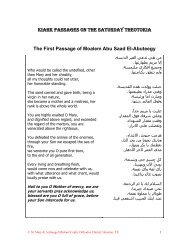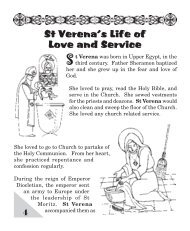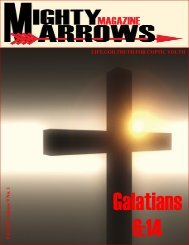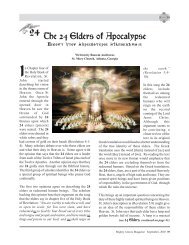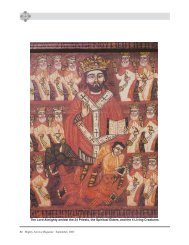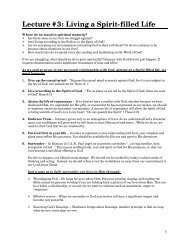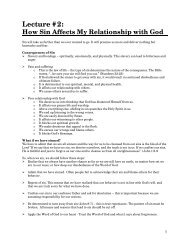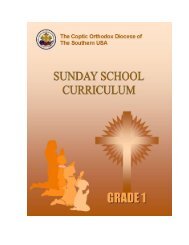Grade 12 - Coptic Orthodox Diocese of the Southern United States
Grade 12 - Coptic Orthodox Diocese of the Southern United States
Grade 12 - Coptic Orthodox Diocese of the Southern United States
Create successful ePaper yourself
Turn your PDF publications into a flip-book with our unique Google optimized e-Paper software.
Sunday School Curriculum <strong>Grade</strong> <strong>12</strong><br />
time and space). It claims that God is just a sum total <strong>of</strong> all that exists. The Hindu religion is<br />
predicated upon this belief; Christianity however, emphasizes God‘s Omnipresence without<br />
overlooking His Divine Transcendence.<br />
4. God is Immutable:<br />
St. James said that with God ―<strong>the</strong>re is no variation or shadow <strong>of</strong> turning‖ (Jam 1:17), King David<br />
also said to God, ―…like a cloak You will fold <strong>the</strong>m [<strong>the</strong> heavens] up, and <strong>the</strong>y will be changed. But<br />
You are <strong>the</strong> same, and Your years will not fail‖ (Ps 102:26,27). Divine Immutability means<br />
unchangeableness. If <strong>the</strong> Divine Nature changes, it is ei<strong>the</strong>r a move away from perfection (in which<br />
case God is no longer perfect) or toward perfection (in which case God was not perfect in <strong>the</strong> past).<br />
Did God lay aside <strong>the</strong> attribute <strong>of</strong> Immutability during <strong>the</strong> Incarnation?<br />
Mutability or change is attributed only to <strong>the</strong> Human Nature <strong>of</strong> Our Lord Jesus Christ, ―Jesus<br />
increased in wisdom and stature‖ (Lk 2:52). The Divine Nature did not undergo any change due to<br />
<strong>the</strong> Incarnation as we confess saying that <strong>the</strong> Divine Nature was united with <strong>the</strong> Human Nature<br />
without mingling, confusion, alteration, or separation.<br />
Can God Suffer?<br />
The Divine Nature cannot be said to suffer, this is called <strong>the</strong> Impassibility <strong>of</strong> God meaning that<br />
God could not undergo anything that could be spoken <strong>of</strong> as ―passion.‖ Never<strong>the</strong>less, during <strong>the</strong><br />
Incarnation, <strong>the</strong> Divine Nature was united (w/o mingling, confusion, alteration, or separation) with<br />
<strong>the</strong> Human Nature <strong>of</strong> Lord Jesus Christ during <strong>the</strong> passion <strong>of</strong> <strong>the</strong> cross. This can be likened to <strong>the</strong><br />
union <strong>of</strong> fire and iron. During <strong>the</strong> hammering <strong>of</strong> <strong>the</strong> iron, <strong>the</strong> iron bends while <strong>the</strong> fire is united with<br />
it. The same happened when Lord Jesus Christ died, <strong>the</strong> human spirit was separated from <strong>the</strong> human<br />
flesh yet <strong>the</strong> Divinity, which never dies was not separated from ei<strong>the</strong>r.<br />
5. God is Omnipotent:<br />
God said to Moses <strong>the</strong> Prophet, ―I appeared to Abraham, to Isaac, and to Jacob, as God<br />
Almighty…‖ (Ex 6:3), and <strong>the</strong> Nicene Creed says, ―Truly we believe in One God, God <strong>the</strong> Fa<strong>the</strong>r <strong>the</strong><br />
Almighty.‖ The belief in an ―Almighty‖ or Omnipotent God is thus an essential element <strong>of</strong> <strong>the</strong><br />
<strong>Orthodox</strong> Christian faith. But what does it mean to speak <strong>of</strong> God being ―Omnipotent‖? The simple<br />
commonsense answer is to say that God can do anything.<br />
Can God create a stone that is too heavy to lift?<br />
If God cannot create such a stone, <strong>the</strong> idea <strong>of</strong> total Divine Omnipotence would seem to be denied.<br />
Yet if God could create such a stone, <strong>the</strong>n <strong>the</strong>re is something else which God cannot do – namely, lift<br />
that stone. And so, again, God turns out not to be Omnipotent.<br />
The belief in Divine Omnipotence means that God is able to do anything that does not involve<br />
obvious contradiction. For example, God cannot make a square circle or a round triangle, which is a<br />
logical self-contradiction.<br />
Once God has opted to do certain things or to act in a certain manner, <strong>the</strong>n o<strong>the</strong>r possibilities are<br />
excluded. For example, if you say, ―God can give a creature free will and at <strong>the</strong> same time<br />
withhold free will from it‖, you have not succeeded in saying anything about God: meaningless and<br />
empty combinations <strong>of</strong> words do not suddenly acquire a meaning because we prefix to <strong>the</strong>m <strong>the</strong> two<br />
o<strong>the</strong>r words; ―God can‖. It remains true that all things are possible with God: <strong>the</strong> intrinsic<br />
198 SEPTEMBER





